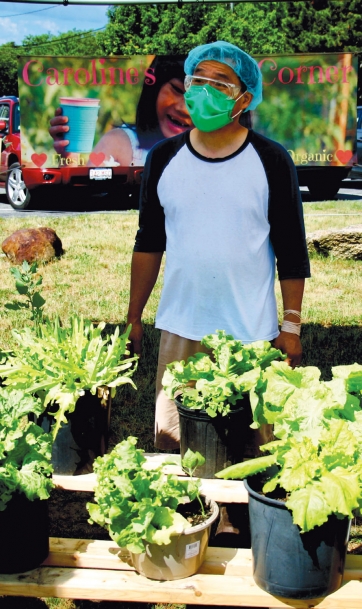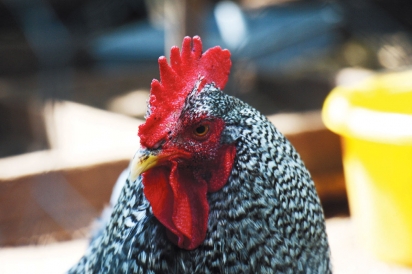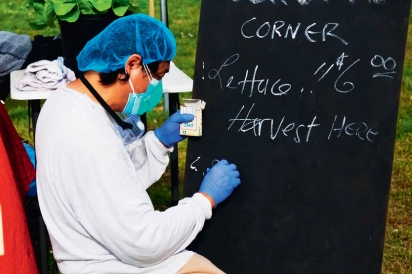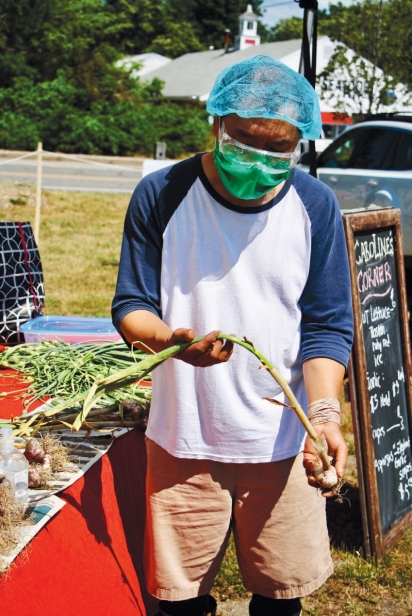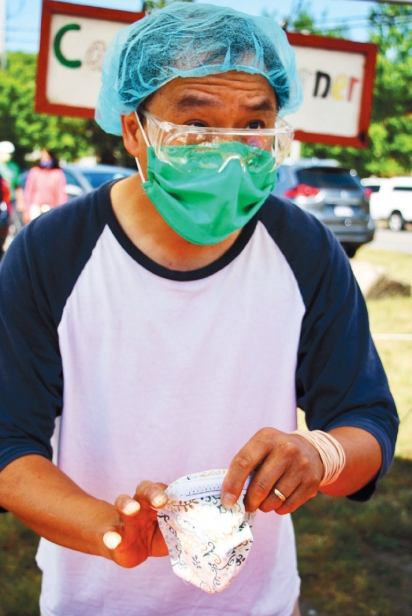Open Wide - Dentist and Farmer, Dr. Benjamin Chung
There are 20 (soon to be 40) chicks in a hand-constructed coop and seed starts nestled in a hoop house, sprouting single heads of lush leaf lettuce. From the spikes of overwintered yet still prolific kale and swaying green garlic scapes, to the rooster trumpeting from the rear corner of this hidden parcel of riotous landscape, there’s no concealing Dr. Benjamin Chung’s love for everything agrarian.
Between partnering with his wife Lillian in raising their five children and being a community’s beloved dentist, one might think that Ben Chung’s days could not possibly accommodate a single thing more. Well, one would be wrong. He attacks his many side-hustles with such passion that more often than not each action spins off another project to explore.
Growing up in Taiwan, China, Dr. Chung’s father moved the family to Toronto in the 1980s, opening a tailoring business in 1986. While attending junior college, Chung worked one summer in this factory which specialized in pants production. “Then I quit my studies for a year to help him, but I knew in my heart that if I kept on sewing, I would be sewing for the rest of my life.”
With his sights focused on dentistry, Chung attended the University of Toronto for his first studies, then moved to Boston and attended Harvard Dental School. There he met Lillian, an MIT student, who would become his wife. Graduating in 1996, he hustled between Lowell, MA, and Boston’s Chinatown, working at two different dental practices. The following year he learned of Dr. Charlie McOuat’s impending retirement in Orleans. The young couple purchased McOuat’s 25-year-old practice, home, and adjoining dental office, becoming Cape Cod residents in 1997.
The next generation of Chungs arrived quickly; there would be five children in just over a decade. As his dental clientele and family size expanded, Chung’s interest in growing food did too, although he wasn’t experienced in gardening. “That was all Lillian,” he says, “She just loves flowers and reads gardening books all the time and has quite a collection of seeds, at least 40 varieties of tomatoes. I wanted our American family to eat good food that tasted fresh and to know about nutrition. My wife got them started growing vegetables together on a parcel of land at the Sea Call Farm Community Gardens in our town.”
Four chickens soon joined the family and the Chungs started a very small garden in their own yard, and it just took off from there. He rototilled away his front yard bit by bit each spring, creating more plots for growing vegetables. “My Uncle Robert, who moved in several houses down the road from us, he really helps us a lot, and the shape of our garden grew larger,” Ben says, adding quietly with an impish grin, “seven or eight years in, maybe it was becoming a small farm?”
As his children grew to a quartet, Ben built raised beds, one for each. To incentivize their commitment, he applied for vendor status at the Orleans Farmers’ Market, promising his young farmer interns that the money from whatever they sold would go to their individual college accounts. The youngest child, daughter Hannah, arrived in 2008. This also marked the first year that the family sold produce. Their booth was launched. Named after their fourth child, Caroline’s Corner opened for business.
The young Chungs were more than pleased to get a split of the weekly proceeds. A few unnamed family farmers may have contributed their green thumbs’-worth of produce, too. At times their offerings may include freshly cut mint, berries, garlic, lovely heads of lettuce and many other vegetables. Ben not only wanted his family to experience better nutrition and earnings, but also to develop the ethic of self-sufficiency firsthand. “When clothes are damaged, people used to stitch and repair them,” says Ben. “Now when a tool breaks, people just throw it away and buy another.”
Brainstorming a 20x10x7-foot hoop house for seed starting and to extend the growing season, Ben gathered his posse for another hand at learning by doing. “We designed it ourselves, out of PVC piping.” he says, “It’s undergone several iterations since, but it’s still our workhorse. The kids and I have learned a lot, like reinforcing it with inner poles to support snow loads.”
Ben admits being totally graced by beginner’s luck in selecting his first seeds. With Cape Cod historically having a short growing season, he aims for varieties with modest maturing times, homing in on spinach, spring onions, kale, swiss chard, and lettuce, followed by tomatoes and cucumbers. He also pops in potatoes, carrots and other root crops, because aside from the occasional watering, he says, “they can practically just do their thing until it’s time to harvest.”
A self-professed “garlicist,” Ben finds he can overwinter it, add some soil nutrients in the early spring, and by June or July have 30-40 types of traditional garlic ready to market, plus at least 10 varieties of the elephant type, which he personally favors because its foliage doesn’t rust. Unwilling to stop at merely raising it, author Ben Chung emerged a few years ago, penning and self-publishing a garlic guide in 2016, entitled Grow Good Garlic on Cape Cod: A Practical Manual for Small Families. In his Amazon description, he urges people to “Find that time with your children…grow good garlic wherever you are!”
Rounding out his homestead’s food forest, Ben planted peach, plum, pear and apple trees, aiming for a mini orchard. Nestled nearby is a patch of crimson strawberries. “Such tiny berries, and their flavor melts in the mouth,” he says.
Bringing his consummate goodwill to the market every Saturday, Ben stops on the way to stake up wooden signs hand painted by his kiddos: bold red tomatoes and strawberries direct visitors to the downtown site. At the market, count him in to help set up a neighbor’s tent or pack it at the close. Shortly after joining the market, he organized and hosted a spirited feast for vendors at an Asian restaurant to celebrate the season’s close. Another idea, the “Grow the largest tomato contest”, was his, as was the prize’s funding.
Early in January of this year, at just about the time he would sow his first seeds in the greenhouse, Ben began hearing the news of a mysterious illness emerging in parts of Asia. He recalls giving several of his disposable surgical masks to a few patients who were about to travel. In weeks, the coronavirus was in the US, with cases quickly escalating. With his early warning of things to come, Ben purchased as good an amount of the masks as he could locate, 20-30 boxes. He also had a stash of N95 masks on hand dating back 17 years to the SARS outbreak. In short time, most of his and others’ supplies ran out.
Soon learning of the many more people and institutions operating without adequate PPE (personal protective equipment), Ben was energized. With his own dental practice closed down by the coronavirus’ spread since mid-March, he operated from his Facebook platform, soliciting N95 mask donations from friends and associates here and in nearby states, forwarding them to those most in need - doctors, dentists, respiratory therapists, nurses, and other front line medical staff. He has sent gear to over 70 different medical offices.
Just like remembering how to ride a bike, Ben revved his sewing machine into production as he made his first prototypes of masks that would improve on the homemade ones most home sewers were making. “It’s important that the air leakage is minimized; these designs need some structure,” he says, “My old sewing skills had never left me. I essentially had been the pocket man at my father’s place, tracing the patterns and sewing dozens and dozens of them every day. That skill is really helping me today.”
Combine perseverance with a creative scientific mind, youthful exuberance and humor, and Ben’s uniqueness emerges. On Facebook you may find him in a self-designed head covering (ringer for a poofy yellow shower cap) with oversized goggles covering his eyes. A trial mask clamped over his nose and mouth for testing, he tests its efficacy by spraying himself with a soy sauce/red dye combo to see if the droplets penetrate the fabric. No dye seeps through, but Ben can faintly smell the soy sauce; he concludes that while not N95 rated, it’s still far better than bandanas or masks made of t-shirt fabric. The trials continue.
The Chung home quickly became a clearing house for raw goods both donated and purchased by Ben, with both the inside and porches overflowing with boxes of components and bolts of non-woven barrier fabric. Initially covering the total expense himself, he shipped package after package of masks, gloves, and hair coverings to whomever reached out to him during those first weeks of the crisis. Many went to overwhelmed professionals in the tristate area such as dentists still needing to handle emergencies, as well as patients and friends who knew of a need among their own families and friends working on the front lines with minimal supplies. As time progressed, Ben donated locally to businesses, local Councils on Aging, and the most at-risk individuals in our communities.
Opening a Facebook fundraiser page for support, financial donations allowed Ben to purchase supplies in bulk when he could find them. Volunteer sewers reached out as well. Soon bundles of raw goods including elastic and metal sheeting for fashioning nasal clips were offloaded by delivery services, cut into pieces by Ben and organized into pickup bundles with instructions for volunteers at his home pick-up/ drop-off location. Often in less than 24 hours the materials were returned, transformed into dozens of meticulously sewn masks, with the offer to sew more.
Through it all, Ben continues his dance, tweaking something nearly every day, fashioning a model face shield, making a mask more efficient or comfortable, and experimenting with various nonwoven vapor barriers. He works extended hours and gives self-imposed goals of sewing 40-50 masks a day himself. All the while, he manages his Facebook page, answering inquiries with a kind word. With the reopening of his dental practice, he’s dropped the chicken coop renovation he had planned so he could make adjustments to protect his clients, employees and himself. He’s retrofitting treatment rooms and reception spaces with an improved HVAC system, and doing practice walk-throughs in a full body suit with air-filtering devices, his head enclosed in a helmet not unlike an astronaut’s. He reminds us that, especially now, we always need to take care of our families, friends and neighbors. “That’s been missing in today’s world. It’s the little people who we know that we can help. Maybe we’ll have a kinder society.”
Most recently learning of the coronavirus’ devastation on the Navajo Nation, Ben reached out. He sent a large box of assorted PPE and is working on a second shipment. “Here’s the deal,” claims Ben, “There’s an opportunity here to make money, or you can try to help people. We are kindred spirits. It’s crazy not to help our fellow humans, our doctors and nurses, our most susceptible members and so many others. People are not disposable.”
Along the way, Ben intersects with many folks. Upon learning of what he is doing, they help out however they can. A fabric wholesaler donated an entire bolt of fabric for only the cost of shipping. Medical offices donated surplus goggles for him to pass on, and he closed his Facebook fundraiser, humbled by the contributions that far exceeded his target goal. The talented Karen Simpson, Fran Lautenberger, Gretel Norgeot, Min Gu and Eva Chow contributed hours of sewing, and neighbors Heather and David Bailey contributed N95 masks. “These are good people,” he says, “They keep me going.”
“It’s funny, you know. Our gardens, markets and communities, they’re kind of a church,” says Ben. “I like people and we are together; people I care about and love. I watch things grow. It gives me peace.”
Ben Chung
Caroline’s Corner – Orleans Farmers’ Market:
May through Fall
Grow Good Garlic on Cape Cod: A Practical Manual for Small
Families is available at Amazon.com


